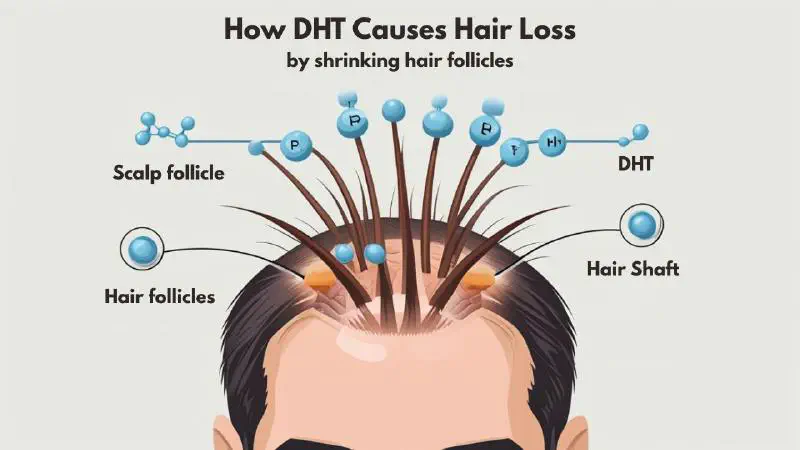Imagine a future where hair loss becomes a distant memory, replaced by flowing locks nurtured through the cutting-edge science of epigenetics. Epigenetics, the study of how genes can be turned on or off by environmental factors and lifestyle choices, is revolutionizing the way we understand hair growth and loss. The potential to unlock specific genes related to hair health promises not only to slow or stop hair loss but also to usher in personalized and effective treatments.
By 2025, this scientific innovation will transform the world of haircare, offering miraculous solutions from advanced epigenetic treatments to the groundbreaking promise of hair cloning. From personalized regimens driven by genetic profiling to diets that activate hair-friendly genes, the future of haircare is poised to blend science, diet, and technology like never before. Whether it’s through figuring out which habits harm your hair’s DNA or discovering foods that promote beneficial gene expression, epigenetic haircare is ready to change lives.
In this article, we’ll delve into how epigenetic advancements will reshape haircare by 2025, shedding light on emerging treatments, diets, and expert insights. We’ll explore the profound impact of gene expression on hair, examine real-world success stories, and consider the ethical challenges ahead. Join us on a journey to prepare for a future where science unlocks secrets hidden within our DNA, offering revolutionary solutions to hair loss.
Understanding Epigenetics and Hair Growth
Epigenetics plays a crucial role in understanding and promoting better hair health. This field of science examines how gene activity can be altered without changing the underlying DNA sequence. Factors such as lifestyle and diet have a significant impact on these epigenetic mechanisms. By leveraging this, researchers aim to develop new and natural treatments for hair loss. Ingredients like Curcuma peptides can be used to reset the epigenetic state of hair, encouraging growth in this innovative approach. As more is understood about how our environment affects gene expression, epigenetic haircare holds the promise of reversing hair loss naturally and enhancing overall hair health.
What is Epigenetics?
Epigenetics studies how external factors can turn genes on or off without altering the DNA itself. For hair health, epigenetics means specific genes linked to hair growth can be modified through lifestyle changes. Advances in this field have shown that methods like mRNA serums and particular diets can activate dormant hair growth genes. As we look toward 2025, researchers have discovered that 30-40% of hair-related genes can be influenced by these epigenetic processes. This directly affects hair loss and regrowth, and opens the door for targeted treatments. Products like CAPILIA LONGA™, which contain curcuma peptides, are examples of how the epigenetic reset of hair bulbs can promote growth. As this knowledge evolves, personalized haircare solutions are becoming increasingly possible, offering hope to those dealing with hair loss and seeking natural remedies.
Epigenetics and Its Influence on Hair Destiny
The concept of “hair destiny” refers to how much control individuals have over the health and appearance of their hair, influenced by genetic factors. Epigenetics suggests that lifestyle changes can activate 30-40% of hair genes. Factors like diet, sleep, and stress play a major role in turning these genes on or off. Nutrigenomics, a key area of study, looks at how what we eat affects our genes. DNA methylation, a process influenced by these lifestyle choices, can silence or activate hair growth genes. Thus, managing lifestyle choices can significantly impact hair health. Environmental toxins also affect hair growth. Therefore, an understanding of epigenetic mechanisms and making informed lifestyle choices can profoundly shift one’s hair destiny. This knowledge empowers individuals to take control of their hair’s future through balanced nutrition and healthy habits.
The Future of Haircare: Innovations by 2025
By 2025, haircare is expected to undergo significant advancements. Groundbreaking research shows that 30-40% of hair genes can activate through lifestyle changes. Such findings open new avenues to reverse hair loss naturally. One major breakthrough is the development of mRNA hair serums. These serums could rewrite follicle instructions, boosting hair growth. Additionally, the Epigenetics Healing Center is using comprehensive blood tests and health history checks to offer personalized hair loss solutions. Meanwhile, UCLA scientists created a molecule, PP405, that may reactivate dormant hair follicles. Initial trials are promising. Epigenetic mechanisms, including mitochondria-to-nucleus communication, also play a vital role in hair restoration. All these innovations mark a shift in how we approach haircare.
Cutting-Edge Treatments in Epigenetic Haircare
Epigenetic haircare is revolutionizing the field with advanced treatments. Nutrients tailored to activate hair regeneration genes are now part of this approach. Recent developments in epigenetic technology from skincare have potential applications in haircare, suggesting a bright future. Early trials with mRNA treatments show little side effects while delivering promising outcomes. These therapies aim to reactivate hair growth genes. Innovation doesn’t stop there; MicroRNA treatments are emerging as less invasive options. They could be topically applied, offering a simpler alternative to techniques like cloning. CAPILIA LONGA™ is another player in this space. It uses an epigenetic reset mechanism with Curcuma peptides and exosomes to revitalize hair density. This treatment reactivates dermal papilla cells, showcasing the versatility of epigenetic solutions.
The Promise of Hair Cloning Techniques
Hair cloning, or hair multiplication, is a promising frontier in addressing baldness. By replacing lost dermal papilla cells, it seeks to restore full hair coverage. Companies like HairClone are driving this technology forward, though it’s not yet widely available in markets like the UK or US. Initially anticipated to be costly, hair cloning’s price should fall over time as technology advances and economies of scale are reached. As development continues, experts are optimistic about hair cloning evolving into an affordable and viable hair loss solution.
Personalized Hair Solutions Through Genetic Profiling
Epigenetic haircare harnesses the power of nutrients to switch on hair regeneration genes. This personalized approach tailors hair growth solutions to individual genetic profiles. Companies like Nutrafol and SelfDecode lead in providing DNA testing for better hair health. Nutrafol offers specialized insights, while SelfDecode delivers customizable reports based on one’s genetics. Though mRNA hair growth treatments are still under clinical review, they show promising results with minimal issues. Red light therapy is another validated method, boosting hair growth by increasing cellular activity. Furthermore, CAPILIA LONGA™, rich in Curcuma peptides, provides an epigenetic reset that revitalizes dermal papilla cells in hair bulbs. Both therapies signify a personalized leap forward in handling hair loss problems.
The Hair Gene Activation Diet
In 2025, epigenetic haircare is transforming how we approach hair health. The Hair Gene Activation Diet aims to reverse hair loss naturally by targeting genetic expression. This diet includes superfoods that activate hair growth genes and support follicle renewal. With a focus on nutrigenomics, this innovative approach is backed by scientific research. By understanding and using the power of food, individuals can alter their hair destiny. Foods rich in specific nutrients can promote hair growth and prevent hair loss, addressing issues like androgenetic alopecia and oxidative stress. This diet, along with healthy lifestyle choices, can play a crucial role in maintaining vibrant hair health.
Designing a Gene-Activating Diet for Hair Health
The science of nutrigenomics shows that what we eat influences our DNA. Designing a gene-activating diet means understanding and leveraging these effects on our genes. Diet has a direct impact on DNA methylation, a process that can either silence or activate hair growth genes. For hair health, this means choosing foods that keep these genes active. Detoxification from environmental toxins also helps by reducing DNA damage. Extensive blood testing and health analysis can aid in crafting a personalized diet plan, ensuring that everyday choices contribute to better gene activation and consequently, better hair health.
Foods That Promote Positive Gene Expression
Eating the right foods can lead to positive gene expression, promoting hair regeneration. Foods like pomegranates, rich in ellagic acid, can help negate oxidative stress. Including oysters in your diet provides zinc, crucial for activating growth-promoting genes. Broccoli sprouts containing sulforaphane reawaken longevity genes, while black sesame seeds improve WNT signaling for follicle renewal. A balanced diet rich in these nutrients not only supports the anagen phase of the hair growth cycle but also helps in reversing the graying of hair. Incorporating these foods means your diet directly supports healthier, stronger hair.
Mitigating Habits That Harm Hair DNA
Daily habits can significantly impact your hair’s health. Chronic stress elevates cortisol levels, suppressing genes vital for hair regeneration. It’s important to manage stress to protect these genes. Avoiding excessive Omega-6 fatty acids also reduces inflammation, linked to oxidative stress and hair DNA damage. Late-night screen exposure disrupts melatonin, weakening the hair growth cycle. To promote healthier hair, it’s wise to limit fried foods and excessive fat which clog hair follicles. Adopting healthy nutritional choices, like those rich in zinc and lignans, ensures long-term hair wellness, making lifestyle selection crucial in maintaining hair DNA integrity.
Starting Your Hair Gene Activation Routine
In recent years, our understanding of hair loss has evolved. We now know that up to 30-40% of hair genes can be switched on through lifestyle choices. This leaves room for optimism for those experiencing hair loss. It’s not all in your genes; you can take control! From maintaining a balanced diet to incorporating innovative haircare products, there are ways to encourage hair health naturally. Thanks to breakthroughs in science and haircare technology, we have compounds like Sandalore showing exciting potential. These developments inspire new routines for restoring hair health by engaging the hair’s genetic blueprint.
Practical Steps for Initiating Your Routine
When starting a haircare routine, it’s important to understand the underlying causes of hair loss. Begin by exploring your health history with a healthcare professional. This can involve blood tests to detect any deficiencies or hormonal imbalances. Once you have a clear picture, focus on lifestyle changes that can activate hair growth genes. This includes proper nutrition, managing stress, and ensuring adequate sleep.
Start with small, consistent changes. Research supports the use of mRNA hair serums, which offer a pioneering method to reset follicle instructions. Additionally, a 21-day plan might help in resetting your scalp’s genetic blueprint, paving the way for healthier hair. Foods like broccoli sprouts hold compounds that can spark dormant hair growth genes. To maximize hair health, focus on a plan that integrates these elements, encouraging a holistic path to fuller, more vibrant hair.
Identifying and Activating Beneficial Hair Genes
The quest to combat hair loss naturally involves recognizing and activating specific hair genes. Leading scientists have made headway with a molecule known as PP405, designed to bring dormant hair follicles back to life. While still undergoing further testing, it represents a potential breakthrough.
Compounds like Sandalore have shown promise in maintaining hair by activating OR2AT4 receptors in follicles. Additionally, studies on microRNA molecules reveal their potential in fine-tuning gene expression, crucial for hair growth. Capilia Longa™ also deserves mention. Rich in plant-derived exosomes, it aims to reset hair bulbs epigenetically and boost hair density. With these advancements, we are closer to unlocking the secrets of beneficial hair genes to counter hair loss.
Creating a Consistent Haircare Schedule
Consistency is key to any successful haircare routine. Staying committed to simple, yet powerful practices can transform hair health over time. Building a schedule around gene-activating foods like broccoli sprouts and pomegranates adds a nutritious edge. Furthermore, techniques like cold rinses or scalp massages enhance blood flow, boosting follicle vitality.
Environmental toxins are a significant hair health concern, but detoxification offers a proactive countermeasure. Regular evaluations of one’s health can personalize these haircare strategies, ensuring they meet individual needs. In conclusion, by embracing a methodical approach, one can foster a nurturing environment for hair health, weaving these discoveries into your daily regimen.
Expert Insights and Case Studies
Epigenetic haircare is revolutionizing the way we think about hair loss and regrowth. By focusing on genetic factors, scientists and researchers are exploring innovative treatments that could change your hair destiny. Exciting initial trials of mRNA hair growth treatments have shown promising results without significant side effects. These therapies focus on personalizing hair care plans through detailed health assessments and epigenetic testing. Evidence is mounting that plant-based compounds like CAPILIA LONGA™ can restore hair bulb activity, leading to denser hair. By combining groundbreaking science with natural ingredients, experts are paving the way for a future where hair loss is not an inevitability, but an option.
Insights from Leading Haircare Scientists
Leading haircare scientists are delving into advanced epigenetic technologies. One key area is mitochondria-to-nucleus signaling, believed to play a critical role in cellular restoration. This cutting-edge research holds promise for both stopping and reversing hair loss. Scientists also point out the important role of nutrients and diet in activating hair growth genes, suggesting nutritional intervention as part of haircare. Though initial trials using mRNA have sparked interest, comprehensive clinical trials are still in progress. Meanwhile, detoxification emerges as crucial in managing hair loss caused by poor lifestyle choices and environmental factors. This understanding shines a light on the interconnectedness of genetics, diet, and health behaviors in achieving healthy hair.
Success Stories: Real-Life Transformations
In 2025, epigenetic haircare is making personalized treatments a reality. These innovative solutions aim to activate genes related to hair regeneration. Initial trials of mRNA treatments have offered hope, showing favorable outcomes with minimal side effects. The Epigenetics Healing Center leads the charge in creating tailored plans for hair loss prevention. They use detailed blood tests and health histories to design these plans. Meanwhile, clinical trichologists provide individualized services that cater to specific needs. The effectiveness of epigenetic methods is emphasized by a study where a topical hair growth ingredient at 1% concentration significantly improved hair growth. These successes affirm that personalized, gene-based treatments could be the future of reversing hair loss.
Challenges in Epigenetic Haircare
Epigenetic haircare is revolutionizing how we approach hair growth. By 2025, new methods could reset hair bulb activity using plant-based growth factors and peptides like Curcuma peptides. These treatments offer a natural way to combat hair loss, but there are hurdles to overcome. One major challenge is confirming the safety and effectiveness of mRNA-based treatments. While promising, more clinical data is needed. Lifestyle decisions, such as exposure to toxins, can worsen hair loss, making personalized health plans vital for healthier hair. As we look to the future, epigenetic technology offers hope for innovative breakthroughs in haircare.
Potential Risks and Ethical Considerations
Despite the exciting prospects of epigenetic haircare, there are potential risks and ethical concerns. Initial trials of mRNA treatments show promise, but their safety is still under review. The technology is in its early stages, and we need more research and understanding before it’s ready for widespread use. UCLA researchers stress the mental impact of hair loss, emphasizing the need for thorough trials and approvals. Ethical considerations include relying on limited human trials to claim reversals of pattern hair loss. Without long-term data, these claims require careful scrutiny and a cautious approach.
Overcoming Skepticism and Misinformation
As epigenetic technology becomes more common in skincare, its application for haircare is gaining interest. Though clinical trials for mRNA hair growth look hopeful, the complete body of data is still coming together. It’s key to understand that quick fixes rarely offer lasting results. The scientific community continues to study how epigenetic mechanisms restore hair, stressing the importance of ongoing research. While many products promise instant solutions, these tend to lack scientific support. Awareness of this helps counter the misconception of quick baldness cures. Instead, science aims to tackle the root causes for lasting effects.
Preparing for a Future with Epigenetic Haircare
Epigenetic haircare is set to revolutionize the way we address hair health by 2025. This field uses cellular mechanisms to rejuvenate both hair and skin. As we understand more about how mitochondrial and nucleus communication plays a role, new haircare solutions are being developed. These focus on restoring hair and skin health in innovative ways. Personalized treatment plans tailored to individual health needs are becoming vital. The Epigenetics Healing Center is at the forefront, emphasizing the need for thorough health analyses. These address specific hair loss concerns and aim to promote hair regrowth. Exciting advancements suggest that future strategies will use specific nutrients to activate hair regenerative genes. Products like CAPILIA LONGA™ demonstrate this potential. They use natural ingredients to reset hair follicles, enhancing hair density by stimulating dermal cell activity.
Staying Informed on Advances and Trends
In 2025, research is shedding light on how lifestyle changes can influence hair health. A significant 30-40% of hair genes can be activated this way, showcasing the role of epigenetic factors. With the development of mRNA hair serums, there’s potential to reshape follicle instructions. This offers new directions in haircare. Mitochondrial and nucleus communication is crucial for restoring normal skin and hair phenotypes. UCLA scientists have developed PP405, a molecule that reactivates dormant hair follicles. Though still in early trials, it promises solutions for reversing hair loss. Advanced epigenetic methods that once focused on skincare are branching into haircare, hinting at future possibilities for combating hair issues.
Planning for Accessibility and Affordability
Ensuring broad access to epigenetic haircare won’t be simple, but it is possible. UCLA scientists have been working on a molecule, PP405, that shows promise in waking up dormant hair follicles. However, it’s not yet FDA-approved. Still, its potential is exciting. Dietary changes can also play a role in hair regrowth by activating genes tied to hair renewal. Nutrition and epigenetic haircare are linked, and the Epigenetics Healing Center offers individualized treatment plans. These are based on detailed health histories and focus on personalized treatment. As an innovative technology, epigenetic mechanisms, including ones involving mitochondria-to-nucleus signaling, are crucial for restoring normal hair growth. With these advancements, the beauty and wellness industry is gradually incorporating these findings, pointing to a future rich with new haircare solutions.





